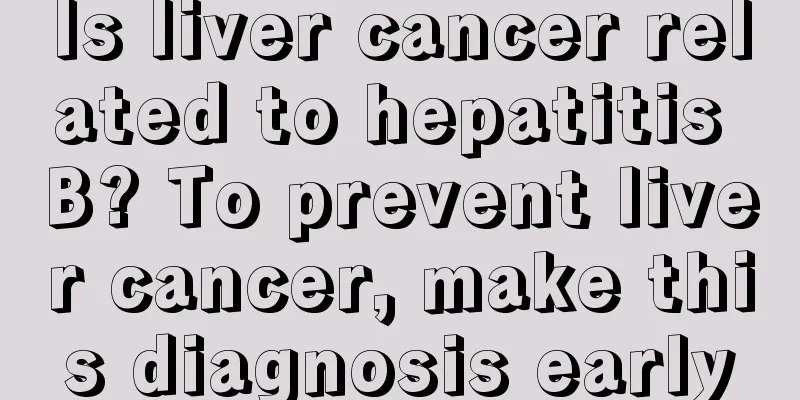Is liver cancer related to hepatitis B? To prevent liver cancer, make this diagnosis early

|
The 2012 my country Cancer Registry Annual Report shows that every minute, 6 people are diagnosed with cancer and 5 people die from cancer in China. The incidence of liver cancer in my country ranks first in the world, accounting for more than half of the world's cases and deaths. Liver cancer has become a serious threat to the health and life of the Chinese people. Recently, the reporter interviewed Professor Zheng Jiasheng, Chairman of the China Cancer Minimally Invasive Treatment Technology Innovation Strategic Alliance and Director of the Cancer Minimally Invasive Intervention Center of Beijing You'an Hospital, on the prevention, diagnosis and treatment of liver cancer. Early diagnosis of liver cancer is most important The fear of cancer reflects people's fear of cancer. Liver cancer was once called the king of cancers. Can liver cancer be prevented? In response to the reporter's question, Professor Zheng Jiasheng clearly pointed out that liver cancer is preventable and curable. "Early diagnosis is especially important for liver cancer." Professor Zheng Jiasheng explained: Medical research shows that liver cancer is preventable. Clinical practice has shown that hepatocellular carcinoma accounts for more than 90% of primary liver cancer in my country. Hepatocellular carcinoma is significantly different from other types of liver cancer, such as intrahepatic cholangiocarcinoma, in terms of pathogenesis, biological behavior, histological morphology, clinical manifestations, treatment methods and prognosis. "The liver cancer we talk about in daily life mainly refers to hepatocellular carcinoma." Professor Zheng Jiasheng said that the risk factors for inducing hepatocellular carcinoma are relatively clear in clinical practice, mainly including chronic hepatitis B virus infection, chronic hepatitis C virus infection, consumption of aflatoxin-contaminated food, drinking water contaminated by cyanobacteria toxins, and long-term alcoholism. Blocking hepatitis B can effectively prevent liver cancer Clinical statistics show that more than 80% of liver cancer patients are related to hepatitis B. Blocking hepatitis B can effectively prevent liver cancer. Professor Zheng Jiasheng said that in my country, mother-to-child transmission of hepatitis B virus is an important way of hepatitis B transmission, and mother-to-child transmission blocking is an important measure to prevent newborns from developing hepatitis B. When mothers with chronic hepatitis B give birth to children, they should be vaccinated with high-titer immunoglobulin and hepatitis B vaccine in time to prevent the transmission of hepatitis B virus to their babies. my country has implemented the hepatitis B vaccination strategy since 1992, and the hepatitis B virus carrier rate has dropped from 9.09% in 2002 to 7.18% in 2007. "At present, my country has provided free hepatitis B vaccination to children under 15 years old, and children who have not received hepatitis B vaccination should also receive a booster shot." Professor Zheng Jiasheng said that adults who have close contact with chronic hepatitis B patients may also be infected with hepatitis B, and hepatitis B vaccination is also an effective means for adults to prevent hepatitis B. Medical personnel, people who frequently come into contact with blood, staff of childcare institutions, organ transplant patients, people who frequently receive blood transfusions or blood products, people with low immune function, and people who are prone to trauma should also be vaccinated with hepatitis B vaccine to prevent hepatitis B infection. Hepatitis C mostly occurs during blood transfusion, and safe blood transfusion can effectively prevent the occurrence of hepatitis C. Professor Zheng Jiasheng emphasized that we should remind the public: To avoid the occurrence of liver cancer, we should stop eating all kinds of moldy food, not drink polluted water, quit smoking and limit alcohol, and maintain a healthy lifestyle, which can block other factors that induce liver cancer. We also need to remind all hepatitis patients to prohibit drinking various beverages containing alcohol. All patients with chronic persistent hepatitis (chronic hepatitis B, chronic hepatitis C) should actively take antiviral treatment under the guidance of a doctor to inhibit the replication of the virus in liver cells, control the hepatitis virus at a low level, reduce liver cell damage, and thus prevent the occurrence of liver cancer. "Blocking various risk factors for liver cancer can effectively prevent liver cancer." Professor Zheng Jiasheng said. Liver cancer can be detected early It is now known to the public that the treatment effects of liver cancer are very different when it is detected early or late. When some patients are diagnosed with liver cancer clinically, most of them have already been diagnosed in the middle or late stages. Can liver cancer be detected very early? Professor Zheng Jiasheng clearly stated that liver cancer can be detected early. However, he wanted to point out that most of the liver cancer patients currently found in clinical practice are indeed in the middle and late stages. "The liver is the largest organ in the human body and is also a substantial organ." Professor Zheng Jiasheng said that because there is no nerve distribution in the liver and lacks sensory function, the tumor is small in the early stage of liver cancer, and patients usually do not feel any discomfort until the tumor gradually grows and pulls on the liver capsule or even erodes the surrounding tissues. Patients will feel pain and go to the doctor when accompanied by symptoms such as vomiting, abdominal distension, weight loss, fatigue, and jaundice. At this time, liver cancer has reached the middle and late stages. Clinically, it has been found that most patients still have no typical symptoms when the liver tumor reaches 3-5 cm. The clinical symptoms of liver cancer are non-specific and may occur in a variety of diseases. It is not easy to associate liver cancer with symptoms alone. Inexperienced doctors are very likely to misdiagnose or miss the diagnosis. Imaging examination is an important means of detecting early liver cancer. Both CT and ultrasound examinations can detect liver tumors with a diameter of more than 0.5 cm. Professor Zheng Jiasheng believes that the early detection of liver cancer cannot rely solely on the examination of patients during outpatient medical treatment. Popularizing liver cancer screening for high-risk groups can detect early liver cancer. "Most liver cancers occur in patients with hepatitis B and hepatitis C. We call them the high-risk group for liver cancer." Professor Zheng Jiasheng pointed out that serum alpha-fetoprotein testing and liver ultrasound examination are important means to detect early liver cancer. Alpha-fetoprotein is an important marker for liver cancer. Its elevated index indicates that the patient may have liver cancer. CT and ultrasound examinations can detect tumors with a diameter of more than 0.5 cm. Professor Zheng Jiasheng reminded that patients with chronic hepatitis B and C should undergo alpha-fetoprotein screening and ultrasound examination every six months. The screening interval for patients with liver cirrhosis should be shortened to once every three months. Regular screening is the guarantee for early detection of liver cancer People often say that having liver cancer is equivalent to a death sentence. Does the medical community currently have any effective treatments for liver cancer? In this regard, Professor Zheng Jiasheng emphasized that with the development of science and technology today, liver cancer is no longer an incurable disease. There are currently a variety of clinical treatments for liver cancer. Surgical resection and liver transplantation of early liver cancer are the most effective traditional clinical treatments. For patients with liver cancer with a diameter of less than 2 cm, the 5-year survival rate after tumor surgical resection is 90%; for patients with a diameter of less than 3 cm and less than 3 tumors, the 5-year survival rate after tumor surgical resection is also 40-70%. Professor Zheng Jiasheng particularly pointed out that minimally invasive ablation treatment technology has become an important means of treating liver cancer. "In the past decade, various minimally invasive ablation technologies for liver cancer treatment have made significant progress in my country." Professor Zheng Jiasheng said proudly that clinicians use imaging equipment to guide minimally invasive surgical instruments, and can directly reach the tumor lesions through percutaneous puncture or perforation. Under real-time image monitoring, radiofrequency ablation, microwave ablation, laser ablation, cryoablation and other minimally invasive surgeries are performed on the tumor to remove the tumor at a specific point, changing the traditional open abdominal surgery model. Minimally invasive surgery for cancer treatment applies the inspection, treatment, monitoring, and evaluation of tumors to the surgical process. The surgery is performed under imaging monitoring, and the tumor treatment situation can be immediately evaluated during the operation. Minimally invasive surgery for liver cancer treatment has accurate positioning, small trauma, few complications, and a wide range of applications. It has a slight impact on the patient's body, can protect the function of human organs to the greatest extent, and the patient recovers quickly after surgery. Professor Zheng Jiasheng revealed that clinical treatment results show that early-stage liver cancer patients who are not suitable for or unwilling to undergo traditional surgical resection and more than 60% of patients with advanced liver cancer can undergo minimally invasive ablation to remove liver tumors, achieve tumor-free survival, and improve their quality of life. my country's minimally invasive ablation treatment for liver cancer has reached the international leading level. It is reported that the Minimally Invasive Tumor Intervention Center of Beijing You'an Hospital has used minimally invasive ablation surgery combined with arterial chemoembolization to treat more than 500 patients with mid-stage liver cancer, with a 1-year survival rate of over 97% and a 3-year survival rate of over 72%. Clinicians can also use radiotherapy and chemotherapy according to the condition of liver cancer patients; use molecular targeted drugs to control tumor growth as a whole; use radioimmunotherapy and gene therapy to remove tiny tumor lesions and reduce liver cancer recurrence; and can also use cell therapy, immunotherapy, and comprehensive treatment of traditional Chinese medicine. The combination of various methods to treat liver cancer has made liver cancer a treatable disease. |
Recommend
How to fix the problem of egg white not being able to be whipped
When making cakes and some desserts, you need to ...
What is nasopharyngeal malignant lymphoma and what is the difference between it and nasopharyngeal carcinoma
Nasopharyngeal malignant lymphoma, many people ar...
The latest method of treating hepatitis C, two methods are indispensable
According to surveys, the incidence of hepatitis ...
What are the common causes of liver cancer? Six causes of liver cancer should be paid attention to
What are the causes of liver cancer? No matter wh...
What causes blood in sputum from tuberculosis?
Tuberculosis is a very common disease and is high...
What to do if TSH rises after hemisection of thyroid cancer
Hemisection of thyroid cancer means that after he...
Getting a cold from air conditioning in summer
In summer, some friends like to set the air condi...
Which items in the blood routine test are more important
A routine blood test is a relatively basic examin...
What should lung cancer patients pay attention to in diet? Lung cancer patients should eat more of these foods
Most lung cancer patients will undergo surgery. F...
How to prevent nasopharyngeal cancer? What should we pay attention to in diet?
Nasopharyngeal cancer has a significant impact on...
What are the three painful places in the early stage of gastric cancer
Gastric cancer is a common and relatively serious...
What to do if you have difficulty falling asleep for a long time
Many middle-aged and elderly people sleep less, h...
How to prevent bladder cancer
I believe many friends are familiar with diseases...
Does washing your hair with salt water have more benefits or harms?
Table salt is not limited to being used for cooki...
What does muscle compensation mean?
Muscles are relatively important tissues in the b...









